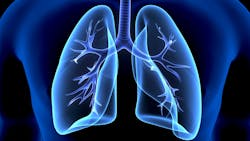In lung cancer, proteins may predict prognosis, improve treatment, diagnostics
Lung cancer is the leading cause of cancer deaths globally and a top cause of cancer deaths in the Military Health System. However, the ability to determine which of these patients have aggressive tumors and which will respond better to certain treatments – could soon be available through the collective analysis of proteins and genomes, according to a new study published November 15 in Cell Reports Medicine, led by researchers at the Uniformed Services University (USU).
The researchers sought to make advancements in this highly lethal cancer by looking specifically at the process through which genes (DNA) are converted to the messenger transcript (RNA), in cells, thus making proteins – a process known as the Central Dogma of Molecular Biology. When things go wrong during this process, the signal can change, thus turning healthy cells into cancer. In this study, the researchers analyzed all aspects of this process by applying several large-scale technologies - whole genome sequencing, RNA sequencing, and proteomic profiling - to the most common type of lung cancer, lung adenocarcinoma. Ultimately, by bioinformatics data analysis of the DNA, RNA, protein, and phosphoprotein in cells – or what they refer to as proteogenomic characterization – they were able to connect certain molecular features of tumors with patient survivability, which could help better predict a patient’s outcome and inform clinical management.
The researchers also identified new tumor characteristics related to immune cells and regulatory networks through this proteogenomic characterization analysis.
Furthermore, the analysis uncovered an entirely new molecular subtype of lung cancer. While previous studies have characterized lung cancer in those who are current smokers and those who have never smoked, this study found a third group, which turned out to be dominated by structural alterations – the disorganized genome – and former smokers. Ultimately, this suggests that not only if you smoked, but when you smoked affects the type of tumor you develop.

